Pushkar (Lake) Fair (Mela) Facts, Story, History, Info, Significance, Importance | What is the theme of Pushkar Mela? | Why is Pushkar Lake sacred? | Why is Pushkar so famous? | Where is Pushkar fair held in which city
Namaste friends, how are you doing today? Welcome to #BhagavanBhakthi website / blog.
Bhagavan Lord Sri Vishnu (Venkateswara, Srinivasa, Balaji, Krishna, Rama, Trivikrama, Narasimha, Vamana, Vasudeva, Mukunda), Goddess Lakshmi (Rukmini, Satyabhama, Sita, Kamala, Maya) and Lord Sri Hanuman blessings to you and your family!
In this website / blog, you will always learn about #Hinduism #Sanskrit language.
Also subscribe to my YouTube channel #BhagavanBhakthi to view videos about #Hinduism #Sanskrit language.
Just before going to the “Pushkar (Lake) Fair (Mela) Facts, Story, History, Info, Significance, Importance | What is the theme of Pushkar Mela? | Why is Pushkar Lake sacred? | Why is Pushkar so famous? | Where is Pushkar fair held in which city“, let us have a brief idea and information.

Pushkar is the name of a famous pilgrimage center known as Pushkara Kshetram (A pilgrimage place known as Pushkar) located in Rajasthan at around 17 km from Ajmer city.
It is said and believed that the lake here known as Pushkara Sarovaram (Lake) was the creation by directly Lord Sri Brahma Deva.
On this Pushkara Sarovaram (Lake) banks, Lord Sri Brahma Deva performed tapas (penance) for several thousands of years. Here, we can find one of the very few limited temples where Sri Brahma Deva been worshiped.
Pushkar shows the 12 years time factor in Vedic terms. Pushkara or Pushkar or Pushkaram is a festival of a particular river celebrated once in 12 years based on the movement of the planet Brihaspati / Guru / Jupiter in the zodiac house.
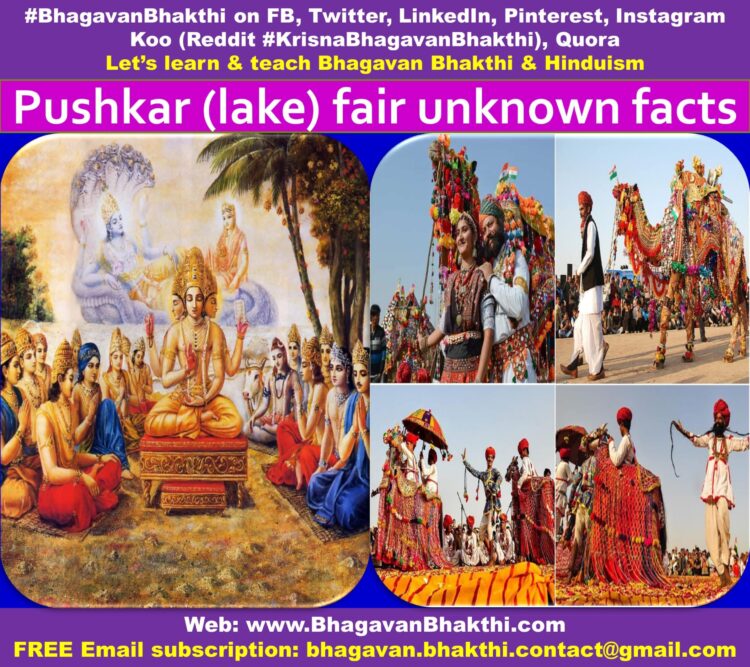
What is Pushkar? – पुष्कर / ಪುಷ್ಕರ / puṣkara / Pushkara or Pushkar is a divine Sanskrit word derived from the element of Push (पुष्टि / ಪುಷ್ಟಿ / puṣṭi / Pushti) meaning nourishment and कर / ಕರ / kara / Kara means one who does it. Thus, Pushkar means, it is the energy that nourishes.
With reference to the sacred rivers, Pushkar means the one who energize the rivers and provide spiritual cleansing. Pushkar also means sanctified water, Sword, Lotus, Swan, Sky, Lake etc.
In the most divine ‘Sri Vishnu Sahasranama Stotram’ sloka (verse) 5, we find a reference to the word ‘Pushkara (Pushkar)’.
Here, Bhagavan Lord Sri Vishnu is referred to as Pushkaraaksho (puṣkarākṣō):
स्वयम्भूः शम्भुरादित्यः पुष्कराक्षो महास्वनः ।
अनादिनिधनो धाता विधाता धातुरुत्तमः ॥ 5 ॥
ಸ್ವಯಂಭೂಃ ಶಂಭುರಾದಿತ್ಯಃ ಪುಷ್ಕರಾಕ್ಷೋ ಮಹಾಸ್ವನಃ ।
ಅನಾದಿನಿಧನೋ ಧಾತಾ ವಿಧಾತಾ ಧಾತುರುತ್ತಮಃ ॥ 5 ॥
svayambhūḥ śambhurādityaḥ puṣkarākṣō mahāsvanaḥ।
anādinidhanō dhātā vidhātā dhāturuttamaḥ॥ 5॥
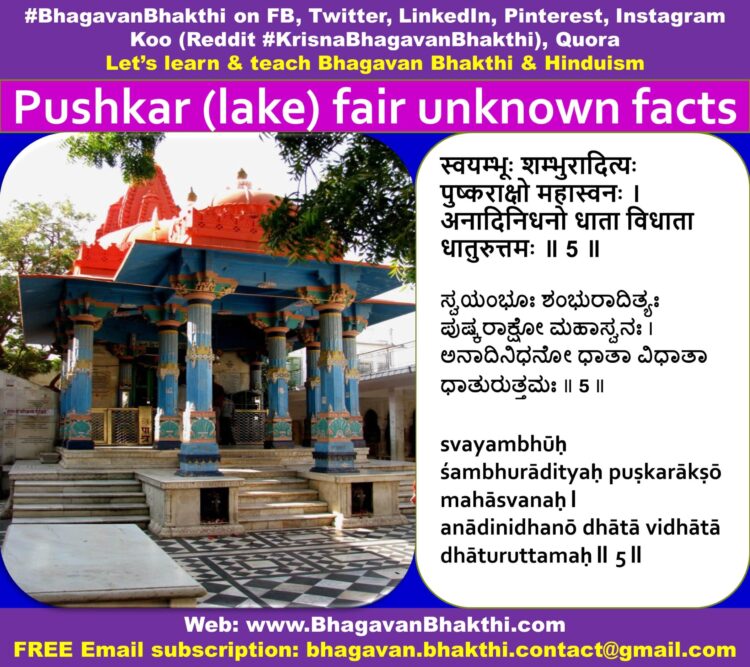
Meaning of puṣkarākṣō – Here puṣkarākṣō means, he is someone who has lotus eyes, the one who provides nourishment to the entire unlimited Universes and the one who is always present in holy Teerthas.
In Tirupati, the water tank near Bhagavan Sri Varaha Swamy temple is known as Swamy Pushkarini. In Astrology also we find a reference to the word Pushkara referred to as पुष्कर नवांश / ಪುಷ್ಕರ ನವಾಂಶ / puṣkara navānśa (Pushkara Navamsha).
This means, it purifies and nourishes the quality of the planet placed within it.
In Astrology, especially for a vivaha muhurta (marriage’s divine timings), we can find preference being given for पुष्कर नवांश / ಪುಷ್ಕರ ನವಾಂಶ / puṣkara navānśa (Pushkara Navamsha) for a given Lagna (Marriage timings) that brings strength to the muhurta period chart.
Who is Pushkar or Pushkara as per Hindu scriptures? – As per the Hindu scriptures, it is said that Pushkar is the son of Lord Varuna Deva. Lord Varuna Deva is the ‘Abhimani Devata’ (Presiding Deity) of all the rivers.
As per the legend, it is said that, once Pushkar prayed to Lord Sri Brahma Deva and asked Him for a boon to live in the sacred waters (emanated from the foot of Supreme Lord Bhagavan Sri Maha Vishnu) of His Kamandal (A divine pot) with the intention of providing purity to all the Teerthas (Divine rivers).
Looking at the selfless desire expressed by Pushkar, Lord Brahma Deva immediately granted him the boon to live in the waters of His Kamandal.
Later, Pushkar also performed tapas (penance) and acquired the जल तत्व सिद्धि / ಜಲ ತತ್ವ ಸಿದ್ಧಿ / jala tatva sid’dhi (Jala Tattva Siddhi) from Lord Shiva as a boon.
By virtue of the boons acquired from Lord Brahma Deva and Lord Shiva, Pushkar became the King of all Teerthas and was regarded as the तीर्थ पालक / ತೀರ್ಥ ಪಾಲಕ / tīrtha pālaka (Teertha Paalak), that is, one who looks after all the divine rivers.

Pushkar and Brihaspati (Jupiter) story – At the time when Pushkar acquired the boons, Brihaspati (Jupiter) the ‘Deva Guru’ also performed tapas (penance) and pleased Lord Brahma Deva.
Looking at the perennial sacredness of Pushkar, the Lord of Devatas Sri Brihaspati wanted Lord Brahma Deva to bless Pushkar to be with him permanently. Whereas, Pushkar was not ready at that time to go along with Sri Brihaspati.
Thus, Lord Brahma Deva resolved the situation by asking Pushkar to get connected with Brihaspati / Guru (Jupiter) for 12 days in the beginning and 12 days at the end of his sojourn in a particular rashi (Zodiac house), the transit of which generally happens once in a year.
With this, twelve holy rivers have been identified in which Pushkar enters each River once in 12 years coinciding with the movement of Jupiter in 12 zodiac signs.
Pushkar Vidhi – Our Hindu Sanatana Dharma seers have prescribed certain austerities to be observed during Pushkar time known as Pushkar Vidhi.
Few of the most important Pushkar Vidhi during Pushkar time are:
1. Pushkar Snan (Taking divine bath), | 2. Pushkar Darshan, | 3. Upavas (Fasting), | 4. Pushkar Vaas (Staying), |
5. Pushkar Daan (Giving charity), | 6. Shiro Mundan (Tonsuring of head), and | 7. Pushkar Pitru Karma.
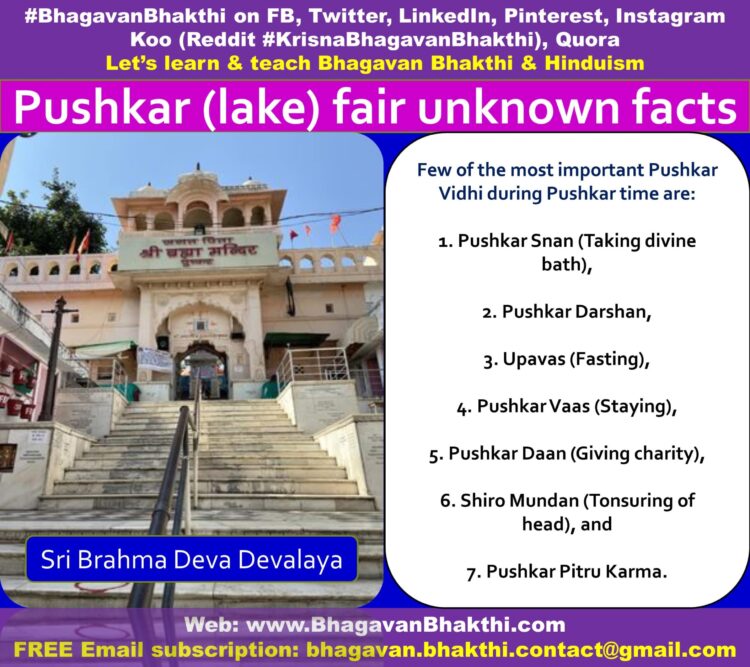
In Hindu Sanatana Dharma, lot of importance has been given for taking bath which is always a नित्य कर्म / ನಿತ್ಯ ಕರ್ಮಾ / nitya karmā / ‘Nitya karma’ and that too in a flowing river is considered as the foremost importance.
Taking bath in a holy river during पर्वकाल / ಪರ್ವಕಾಲ / parvakāla / Parvakal is much more pious and when it is the days of Pushkar the merits are manifold.
In Hindu Sanatana Dharma scripture, it is said that during Pushkar, all the Brahmaadi Devatas (Lord Brahma Deva and other Devatas / Demigods), Sages and Pitru Devatas will be residing in that Teertha (River) along with Brihaspati (Guru / Jupiter) and Pushkar.
During Pushkar, all the teerthas in the Universe will be entering into that particular river and will be flowing as अंतर्वाहिनि / ಅಂತರ್ವಾಹಿನಿ / antarvāhini / Antarvahini (River moving inside).
Doing snan (Divine bath) in a Pushkar river will help to cleanse the inner selves, wash out the evil propensity and open up a path for a Dharma (righteous) living.
This snan (Divine bath) should be taken early in the morning before Sunrise during Brahmi Muhurtam. This time is highly auspicious time. Hindu scriptures tell that, Pushkar Snan also has curative properties from chronic diseases.
After Pushkar Snan, one has to pray and give Arghya to the concerned Pushkar Teertha (River), Teertha Raja (Pushkar), Brihaspati / Guru / Jupiter, Bhagavan Lord Sri Vishnu who is eternally present in all the –
Teerthas, Brahmadi Devatas (Brahma and other Devatas / Demigods), Vashishthadi Sages (Vashishtha and other Rishi / Sages), Gangadi nadis (Ganga and other rivers) and the Sri Surya Deva.
Pushkar schedule and blessed rivers – It has become a tradition since the unknown time to celebrate the movement of Brihaspati / Guru / Jupiter in a particular house in the zodiac house as the Pushkar festival of a particular river.
The Pushkar schedule is as given below: Pushkar schedule usually starts with Ganga River when Brihaspati / Guru / Jupiter enters into Mesha Rashi which is the first sign in the zodiac house.
Pushkar schedule for a particular river will be for one year, whereas, the first 12 days known as ‘Aadi Pushkar’ and the last 12 days known as ‘Antya Pushkar’ are held to be highly pious.
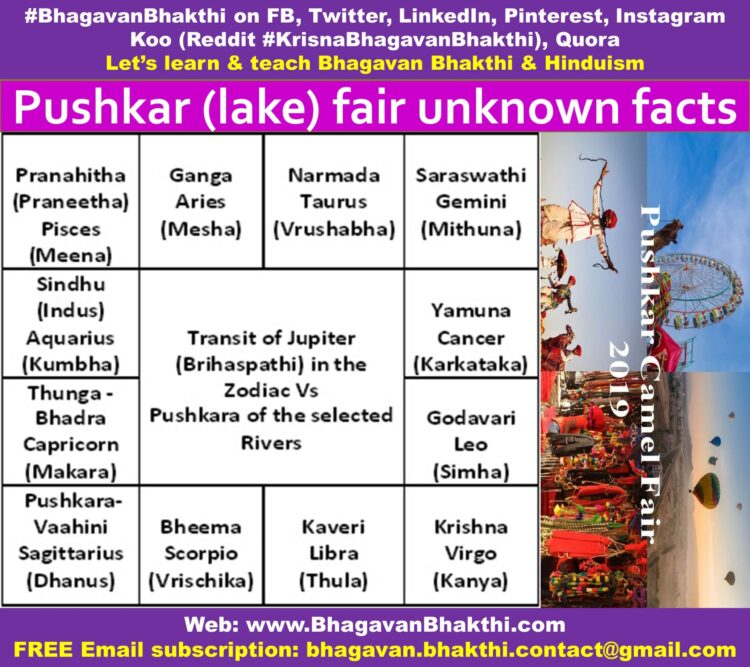
Pushkar Pitru Karma – Pitru Yagnas like performing Pitru श्राद्ध / ಶ್ರಾದ್ಧ / śrād’dha / Shraaddha, living tarpan have been prescribed to get discharged from Pitru Runa.
This has been in continuously performed since the unknown time and even अवतार पुरुष / ಅವತಾರ ಪುರುಷರು / avatāra puruṣa / Avatar Purushas like Bhagavan Sri Rama, Bhagavan Sri Parashurama have performed Pitru karma.
(We should always remember that Bhagavan Sri Rama or Bhagavan Sri Parashurama or any of Bhagavan Lord Sri Vishnu’s avatar need not be performing any material rituals.
But, Bhagavan shows us the path on how to perform, so that we common people should learn and perform the same in the correct way.) We, the ordinary human beings are no exception to this dictum.
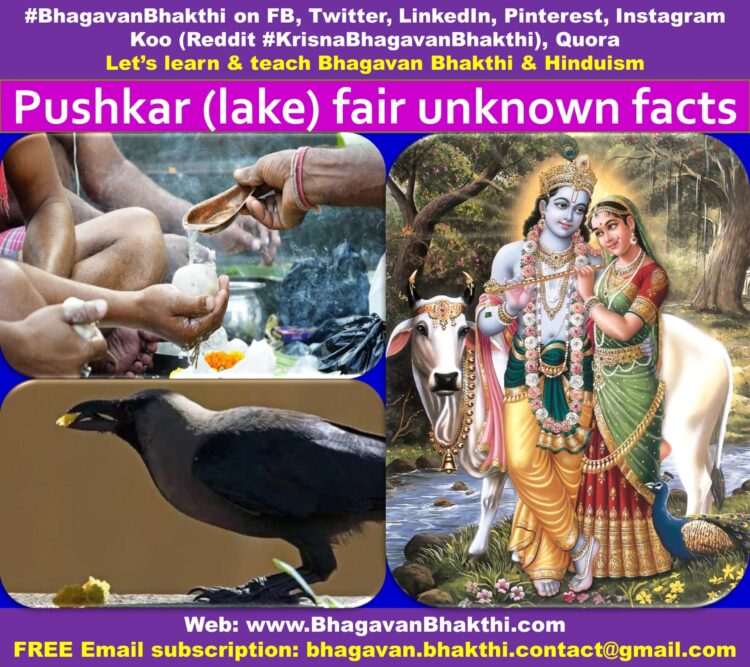
Performing Pitru Karma during Pushkar days also forms part of the Pitru Yagna which is considered as highly auspicious and worthwhile. Only those who have lost their parents are eligible to perform the holy rituals to their ancestors.
Pitru karma during Pushkar days has to be performed for all the deceased (Sarva Pitru / All ancestors). It has to be performed on the banks of the sacred Pushkar River like a Teertha Shraaddha.
This has to be performed preferably in the form of Anna Shraaddha with Pinda Pradhana and Brahmana Bhojana.
Hiranya Shraaddha is also in vogue where instead of rice, wheat flour is used for making Pindas and instead of Brahmana Bhojana they will be offered Dakshina.
Pushkar shraaddha can be performed on any day during the 12 day period of Pushkar, or on the 9th day or on the Pitru tithi day if it coincides except on the day of Ekadashi.
Our scriptures say that, Pitrus (Ancestors) will descend on Earth during Pushkar days and will reside on the banks of Pushkar River longing for their off-spring to perform Pitru Shraaddha.
Performing Pushkar shraaddha, one will be bestowed with blessings from ancestors, peace and prosperity to the family. It will also work as cure for various mundane problems one is facing in life related to marriage, progeny, health, poverty etc.
To know about the Mahalaya Shraddha, visit this link: What is Mahalaya Shraddha (Pitru paksh)
To know What is Pitru paksh (Mahalaya) tarpan, rituals, shraddha significance: What is Pitru paksh (Mahalaya) tarpan, rituals, shraddha significance
Pushkar Daan (Charity) – At the time of Pushkar Snan, Shraaddha and Daan are considered to be highly pious and this gives eternal results.
This daan (charity) can be given to Brahmins in the form of Dasha Dana (10 in number) or Shodasha Daan (16 in number).
Some of the Pushkar charities are as given below:
Madhu Daan (Honey), | Bhu Daan (Land) | Anna Daan (Food), | Svarna Daan (Gold), | Guda Daan (Jaggery,) | Grantha Daan (Hindu sacred book), |
Paada Raksham Daan (Sandals / Chappals), | Ghee Daan, | Chatra Daan (Umbrella), | Rajata Daan (Silver), | Vastra Daan (Clothes), | Pinda Daan, |
Paatra Daan (Vessels like brass, silver etc.), | Salagrama Daan, | Ghanta (Bell), | Hand Stick, | Nava Dhanya Daan (Nine cereals), |
Go Daan (Cow), | Kshira Daan (Milk), | Asana Daan (Mat), | Shayya Daan (Bed), | Phanka Daan (Fan), | Phal Daan (Fruits) etc. |

The divine Pushkar is a very big river based festival in India. Lakhs of people including foreign tourists participate in this huge gatherings.
Since unknown time, Hindus consider rivers as pious, divine and river worship in the form of Pushkar is performed to make the mankind realize the significance of water the life sustaining force.
It is our wholehearted duty to respect and follow the rituals, ceremonies, traditions and culture pioneered by our ancestors with a great foresight and Pushkar is one such pious Hindu sampradaya (tradition) that has descended from our divine Rishis (Sages) which is highly auspicious and meritorious in all the ways.
Merits and Significance of Pushkar: In the Astrological way, Brihaspati / Guru / Jupiter is the most benevolent planet symbolizing the –
learning, progeny, knowledge, wealth, auspiciousness, fortune, divinity, domestic peace and above all the कारक / ಕಾರಕ / kāraka / karaka (Doer) for occurrence of Pushkaram.
Pushkar, the Teertha Raja (King of all the divine ponds) always resides in the Kamandala (Divine pot) of Lord Sri Brahma Deva in the sanctified waters that has emerged out from the foot of Bhagavan Lord Sri Vishnu.
Entry of Pushkar into a particular river signifies the Pushkar festival. This happens when all the –
Brahmadi Devatas (Brahma and other Devatas / Demigods), all the Sages, all the Pitru Devatas, all the Theertas in this Bhoomandalam (Earth) including the most pious Ganga enters into that particular river along with Brihaspati and Pushkar.
This time of their entry into a particular river is considered as highly holy and this has the power to diminish the terrible and horrible sins committed.
Doing one darshan (Divine view), taking bath, touching Pushkar waters, drinking the holy waters of Pushkar is considered to be highly meritorious and soul cleansing.
This is considered as the most holy time to perform ceremonies of ancestors on the banks of Pushkar River that will help them to attain divine liberation.
More information will be added to this on regular basis. Please this post and other posts of this website / blog to get the updated information.
To watch videos on #Hinduism #Sanskrit language, SUBSCRIBE to my YouTube channel from this link: #BhagavanBhakthi YouTube channel
To know more about the pilgrimage places of India, click this link: Pilgrimage places of India
To know “Venkatachalam hill (Tirupati / Tirumalai) names in different yugas”, click this link: Venkatachalam hill (Tirupati / Tirumalai) names in different yugas
To know more about Bhagavan Sri Srinivasa / Venkatesha / Balaji, click this link: About Bhagavan Sri Srinivasa / Venkatesha / Balaji on Bhagavan Bhakthi website
Dear friends, if you need any clarifications about this post, kindly let me know, I will definitely try to answer all of them.
Also your one LIKE, one COMMENT, One Share, one SUBSCRIPTION is highly important.
This will help to know the quality of this content and also it will be helpful to know if any improvements is required for the content.
If you feel this content is useful to you and has helped you to improve your knowledge, kindly share this with your well-wishers.
Because “SHARING MEANS CARING”.
To receive FREE EMAIL SUBSCRIPTION about #BhagavanBhakthi, you can send an email to [email protected] from your email ID.
NAMASTE!
Sri Gurubhyo Namaha
Sri Krishnaaya Namaha
Sri Krishnaarpanamastu
Share in Social Media